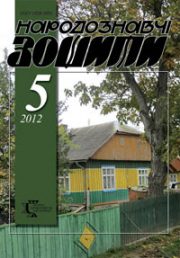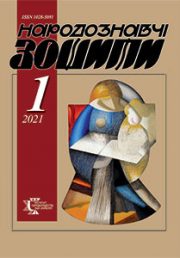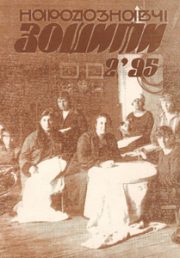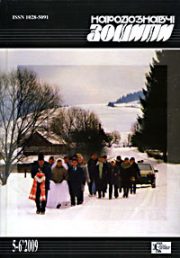The Ethnology Notebooks. 2019, № 5 (149), 1331—1341
UDK 398.83:392.5](477.83-2)
DOI https://doi.org/10.15407/nz2019.05.1331
WEDDING SONGS LADKANKAS FROM VERKHNIA ROZHANKA
SOKIL Hanna
ORCID ID: https://orcid.org/0000-0002-8352-2124
Doctor of Philological Sciences, Professor,
Ivan Franko National University of Lviv,
Universytetska Street 1, 79000, Lviv, Ukraine
e-mail: gan.sokil@gmail.com
Abstract. The article focuses on wedding songs of the village Verkhnia Rozhanka in Skole district of Lviv region. According to the ethnographic division this village belongs to Boikivshchyna area where wedding songs are called ladkankas. Ladkanka type (the term used by F. Kolessa) is one of the oldest rhythmical and melodious types. The subject of the research is field materials recorded at the beginning of the ХХІ century. It is known that at the current stage traditional wedding songs, as well as the very folk rituals, have undergone significant transformations, mainly they became part of the passive fund. By goingback to our roots we should understand our past on the basis of folk rituals and customs where the topicality of the problem is reflected as ladkankas reflect specific nature of Boiko wedding, render the atmosphere of the everyday life, represent substantial meaning and motive fund, imagery system, reflect moral and ethical, aesthetic, legal and other norms and relationships between family members, members of one’s lineage, community, etc. All these elements represent a powerful Ukrainian folklore fund with its common national basis and peculiar regional diversity.
Wedding songs ladkankas accompanied by different stages of ritual actions — vinkopletyny (flower wreath twining)», plait combing, a visitof the matchmakers («train») from the fiancй to the fiancйe, how the fiancй or fiancйe got seated «як посадили молоду чи молодого на посад», how wedding guests go «як ідут придани», how starosta «chops off» the fiancйe’s head «як староста «стинає» голову молоді», how head scarf is tied «як завивают чипиць, хустку», how fiancйe has head scarf tied on her head «як чіпкают молоду», the end of the wedding, gratitude to the hosts. Ladkankas in Verkhnia Rozhanks are performed by svashkas — special young girls who on behalf of the young couple or other participants of the ritual explain the events taking place during the wedding.
The songs are accompanied by music. Melodies have been transcribed by Khrystyna Popovych, who reproduced different variants, pitch and tempo levels of their performance, their style and emotional expressiveness, typical agility of ladkanka inside the ritual, its flexibility and diversity.
Keywords: Boiky wedding, wedding songs ladkankas, wreathtwining, fiancй, fiancee, matchmakers, wedding starosta.
Received 28.09.2019







